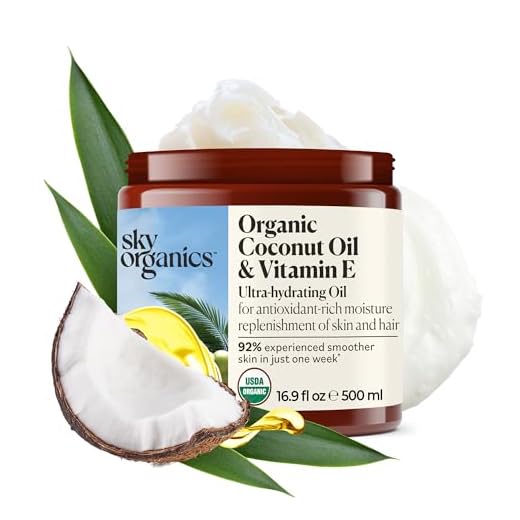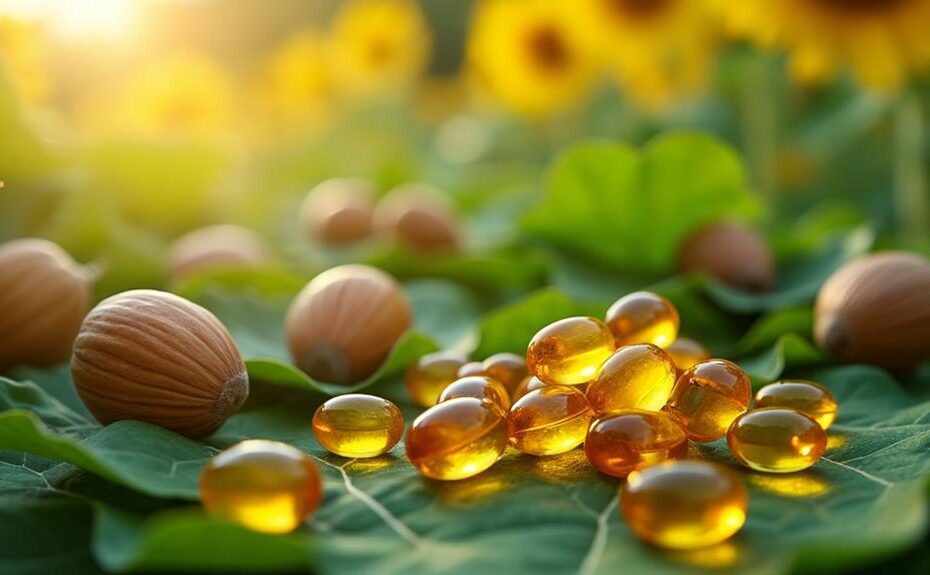







Vitamin E is an essential antioxidant that helps prevent oxidative stress by neutralizing free radicals. These free radicals can cause cellular damage if they're not kept in check. By primarily functioning as a lipid-soluble peroxyl radical scavenger, Vitamin E donates hydrogen atoms, thereby inhibiting oxidative chain reactions. Research shows that adequate Vitamin E intake considerably lowers markers of oxidative stress, such as malondialdehyde levels, while enhancing the activity of important antioxidant enzymes. This protective action is essential for maintaining cellular integrity and function, particularly for those exposed to stressors. You might find it fascinating to explore the broader implications of Vitamin E.
Key Takeaways
- Vitamin E is a potent antioxidant that neutralizes free radicals, reducing oxidative stress and cellular damage.
- It protects cell membranes from lipid peroxidation, preserving cellular integrity and function.
- Vitamin E supplementation enhances the activity of key antioxidant enzymes, boosting the body's overall antioxidant defense system.
- It lowers malondialdehyde (MDA) levels, a marker for oxidative stress, indicating improved cellular protection.
- Adequate Vitamin E intake is crucial for overall health maintenance, especially in aging populations and those experiencing stress.
Understanding Oxidative Stress
Oxidative stress arises when your body can't keep up with the production of free radicals, leading to an imbalance that fosters cellular damage. Free radicals are highly reactive molecules produced during normal metabolic processes or as a response to environmental factors. When their levels exceed your body's antioxidant capacity, oxidative damage occurs, affecting lipids, proteins, and DNA. This damage is implicated in various diseases, including cancer, cardiovascular conditions, and neurodegenerative disorders. Vitamin E's essential role as an antioxidant is significant in neutralizing these free radicals and protecting the body against oxidative stress.
Antioxidants, such as Vitamin E, play a significant role in neutralizing free radicals and mitigating oxidative stress. Vitamin E is lipid-soluble, allowing it to protect cellular membranes from oxidative damage effectively. It scavenges free radicals and inhibits lipid peroxidation, a process that can compromise cell membrane integrity. During situations of heightened oxidative stress—like inflammation or intense physical activity—Vitamin E maintains cellular stability and function.
A deficiency in Vitamin E can lead to increased oxidative stress levels, heightening your vulnerability to environmental factors and disease. As a result, understanding oxidative stress and the protective role of antioxidants like Vitamin E is essential for maintaining health and preventing oxidative damage.
Importance of Vitamin E
While many nutrients contribute to your overall health, Vitamin E stands out due to its potent antioxidant properties that are essential for protecting your body from oxidative stress. This vitamin plays a critical role in neutralizing free radicals, thereby reducing the likelihood of cellular damage. One of the key ways it does this is by protecting cell membranes from lipid peroxidation, a process linked to the deterioration of cell function. Additionally, Vitamin E supports skin and hair health by neutralizing free radicals and aiding in wound healing. Research shows that high doses of Vitamin E, specifically at 40 mg/kg daily, can markedly decrease levels of malondialdehyde (MDA), a biomarker of oxidative stress. By lowering MDA, Vitamin E can help mitigate the harmful effects of oxidative stress, which is associated with various diseases, including cancer and cardiovascular disorders.
Additionally, Vitamin E may enhance the activity of important antioxidant enzymes such as catalase and superoxide dismutase. This enhancement contributes to a more robust cellular defense against oxidative damage, reinforcing the importance of Vitamin E in maintaining your overall health. By ensuring adequate Vitamin E intake, you can better equip your body to combat the detrimental effects of oxidative stress.
Mechanisms of Action
One of the fascinating aspects of Vitamin E is its role as a powerful lipid-soluble antioxidant, primarily in the form of alpha-tocopherol. It neutralizes free radicals by donating a phenolic hydrogen atom, effectively inhibiting oxidative chain reactions in cell membranes. This action is essential for protecting polyunsaturated fatty acids, which helps maintain cellular integrity and function. Moreover, Vitamin E has been shown to enhance overall well-being, including heart health support, which is crucial for preventing oxidative stress-related diseases.
Vitamin E's antioxidant properties greatly reduce levels of malondialdehyde (MDA), a byproduct of lipid peroxidation and a marker for oxidative stress. By lowering MDA, you can gauge a decrease in oxidative damage within your body. Additionally, Vitamin E enhances the activity of key endogenous antioxidant enzymes like glutathione peroxidase (GPx), catalase, and superoxide dismutase (SOD). These enzymes play important roles in detoxifying reactive oxygen species (ROS), thereby fortifying your antioxidant defenses.
Through these mechanisms, Vitamin E mitigates oxidative stress, which is linked to various diseases, including cardiovascular disorders and neurodegenerative conditions. By understanding how Vitamin E operates, you can appreciate its importance in maintaining health and preventing oxidative damage.
Research Methodology
The research methodology employed in studies examining Vitamin E's role in preventing oxidative stress is robust and meticulously designed to yield clear insights. In these studies, rats undergo immobilization stress for two hours daily, simulating stress conditions to assess oxidative damage. This experimental setup allows researchers to observe the effects of Vitamin E on oxidative stress parameters effectively.
Vitamin E is administered intraperitoneally at a dosage of 40 mg/kg daily in the experimental groups, aiming to establish its protective effects against stress-induced oxidative damage. To quantify oxidative stress, researchers measure malondialdehyde (MDA) levels and assess the activity of antioxidant enzymes such as glutathione peroxidase (GPx) and superoxide dismutase (SOD). Comparing these measurements between Vitamin E-treated and control groups provides valuable insights into the antioxidant effects of Vitamin E.
Additionally, the study design includes evaluating Vitamin E supplementation's impact on muscle function and oxidative stress markers in both young and aged rats subjected to repetitive loading exercises. This thorough methodology guarantees a complete understanding of Vitamin E's role in mitigating oxidative stress, offering evidence-based conclusions for potential therapeutic applications.
Study Findings
Findings from various studies underscore Vitamin E's noteworthy role in combating oxidative stress. Research indicates that Vitamin E supplementation leads to a marked decrease in malondialdehyde (MDA) levels, a fundamental biomarker for oxidative stress. In controlled studies, subjects receiving Vitamin E showed considerably lower MDA levels compared to those who did not, highlighting its protective effects.
Moreover, administration of Vitamin E has been associated with increased antioxidant enzyme activities, such as catalase (CAT), glutathione peroxidase (GSH-Px), and superoxide dismutase (SOD). These enzymes play essential roles in neutralizing free radicals, thereby reducing oxidative stress and promoting cellular health. The protective effects of Vitamin E are particularly pronounced under both acute and chronic stress conditions, suggesting its potential utility as a therapeutic agent.
Additionally, studies have demonstrated that Vitamin E mitigates exercise-induced oxidative stress, particularly in aged rats, leading to enhanced muscle function and overall health. Its function as a lipid-soluble peroxyl radical scavenger effectively prevents lipid peroxidation and cellular damage, emphasizing Vitamin E's critical role in safeguarding cellular integrity against oxidative challenges.
Implications for Health
Considering the significant role of Vitamin E in reducing oxidative stress, its implications for health are profound. As a potent lipid-soluble antioxidant, Vitamin E, particularly alpha-tocopherol, neutralizes free radicals, thereby protecting cellular membranes from lipid peroxidation. This action not only reduces oxidative stress but also lowers markers such as malondialdehyde (MDA), especially in aging populations or those under physical stress.
Supplementing with Vitamin E has been shown to enhance the activity of key antioxidant enzymes, including glutathione peroxidase and superoxide dismutase, which bolster your body's overall antioxidant defense system. Improved antioxidant capacity translates into better immune health, as Vitamin E helps reduce oxidative stress on immune cells, enhancing their response to infections.
Moreover, Vitamin E's role in cardiovascular health cannot be overlooked. Research suggests it may lower systolic blood pressure and reduce LDL cholesterol levels, both of which are linked to oxidative stress. By mitigating these health risks, Vitamin E not only supports cardiovascular health but also contributes to overall well-being, confirming its importance as a critical nutrient for maintaining a healthy lifestyle.
Future Research Directions
There's a growing need for research that investigates deeper into the mechanisms by which vitamin E exerts its antioxidant effects, especially in various stress-related conditions and diseases. Understanding these pathways could clarify how vitamin E supplementation impacts oxidative stress and its related disorders. Investigating ideal dosages and synergistic effects with other antioxidants, such as vitamin C, is vital. This knowledge could enhance the efficacy of combined approaches to reducing oxidative stress.
Moreover, long-term studies focusing on vitamin E supplementation's role in age-related diseases are essential. As populations age, understanding how vitamin E influences oxidative stress in vulnerable groups can inform preventive strategies. Research should also explore the bioavailability and metabolism of different forms of vitamin E, identifying which types are most effective in combating oxidative stress.
Lastly, examining dietary sources of vitamin E across diverse populations can provide insights into their protective roles against oxidative stress and chronic diseases. By focusing on these areas, future research can substantiate the potential of vitamin E in promoting health and mitigating oxidative damage in various contexts.
Conclusion
In conclusion, vitamin E plays an essential role in combating oxidative stress by neutralizing free radicals and protecting cell membranes. For instance, consider a study involving older adults where higher vitamin E intake was linked to reduced oxidative damage markers. This suggests that incorporating vitamin E-rich foods could enhance cellular health and potentially lower the risk of age-related diseases. As we continue to explore its benefits, understanding vitamin E's mechanisms can pave the way for effective dietary interventions in oxidative stress management.





